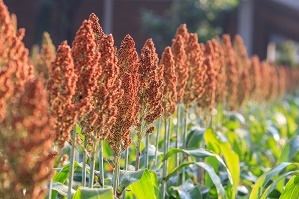Carbon dioxide (CO2) is a greenhouse gas that has been highly linked to global warming and climate change, but it has also been shown to be beneficial for the physiology of sorghum, according to a study from the University of Sao Paulo’s Bioscience Institute in Brazil.
Carbon dioxide was found to protect plants and promote a systemic adjustment in their metabolism when in a low-humidity environment. The seeds also accumulated 60 percent more protein.
"Like sorghum, other plants suffering drought stress as climate change advances can be protected by rising levels of atmospheric CO2. While this is an undesirable condition, we can learn a great deal from it about the behavior of sorghum and similar plants, as well as about how to develop improvement strategies," Marcos Silveira Buckeridge, the principal investigator for the project "Using Systems Biology Approach to Develop a Model for Whole Plant Functioning,” said.
The study shows the effects of carbon dioxide in a drought on sorghum that could lead to conclusions about the effects of plants like sorghum, such as sugar cane.
"While most research in the field focuses on specific parts of plants, such as leaves, stems or roots, we set out to understand sorghum as a system," Buckeridge said. "We studied the interactions among its organs when subjected to water stress combined with high levels of CO2. Whole-plant metabolism studies of this kind improve our understanding of the implications of modifying several genes or introducing an entire metabolic pathway into one organ, such as a system in the stem that accelerates water transport. This requires investigating what happens not just in the stem but also in leaves, flowers and seeds, producing a broader picture without losing the specific focus on the more reduced level of processes, i.e., the plant's biochemistry."
Brazilian study shows carbon dioxide is beneficial to sorghum




 Alerts Sign-up
Alerts Sign-up